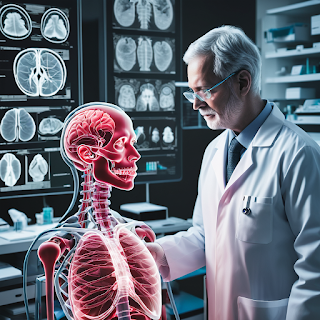AI powered technologies warn and hasten in treatment of risky health issues
Life has turned into a new landscape with the inception of cutting-edge technologies. Technical giants are constantly evolving novel technical gadgets to augment the living of human beings, managing their mental and physical well-being and effectively deal with life threatening syndromes to enhance life expectancy.
AI
opens a great avenue in medical science to revolutionize diagnosis, and
treatment of continually emerging health threats. AI generated technologies
that include machine learning, deep learning instantly provides sensitive
information to medical experts, surgeons and health counselors who care for
life threatening diseases, lessen human errors through intervention of
technologies and people can access service 24/7 with AI assisted medical
facilities. These pioneering technologies accelerate communication between
doctor and patient with precision, transcribe medical documents, such as
prescriptions, and provide medical assistance from remote locations.
AI
algorithms can quickly recognize anomalies that may be unnoticed by a treating specialist.
Patients' clinical reports and extensive data generated by AI powered
technologies assist in diagnosis of critical illness and provide precise
details to take prompt action in treatment. Furthermore, AI powered
technologies highlight early signs of chronic or fatal diseases in radio
diagnostic reports such as X-rays and MRI scans and improve the health results.
Ai
powered technologies are highly effective in automation of documentation,
organizing health facts and equipping medical scientists to discover new
vaccines or drugs in emergencies or explosion of sudden viruses or serious
disease.
All
is not magical in AI powered technologies in health care. There are some
challenges in using AI algorithms in diagnostic and treatment of critical
diseases. Key challenge in AI systems is data collection which can grip in
controversy due to patient privacy and explosive incidents of data breaches by
companies in the cyber environment. Additionally, AI systems are well trained
in collecting patient’s data but if it provides biased reports then it will be
dangerous for the health of people. Major worrisome effect of AI powered
technologies in health management is the hacking of medical gadgets used by
patients such as pacemaker or wearable technologies such as Apple watch that
monitor heart rate and other health parameters. Due to evil intention,
cyber fraudsters may deliberately manipulate in the inputs of the device. They
can inject toxicity in the training data of AI models to ruin the specific
function. Pacemakers that are embedded in the heart to function smoothly can be
hacked by Cyber crooks to succeed in their mission. Though AI driven models are
well efficient to collate data, craft text, images, and point perfect phishing
emails that lack the red flags to be recognized as malicious, still bad actors
are smart to poison the AI generative software to position malware, and steal
sensitive data of patients.
AI
limitations can be overpowered through a precise pool of data, harnessing
security layers and AI algorithms can channelize the healthcare industry with
excellent outcomes.
A drop of AI technical power in healthcare:
Healthy
mental and physical body is a marker of decent living in a technically driven
world. Humans have upgraded their life and enthusiastically responded to
upcoming health threats. AI generated technologies are transforming people to
manage their health and generate health awareness to sense danger signs before
it becomes worst. Generative AI model offers real time data to improve doctor
and patient relationship. Through tracking patient history, AI powered systems
may be helpful in diagnosis and treatment of life threatening illnesses.
Important note:
Above
article is based on environmental input and displays personal views of the
writer. Information provided in the article is for general awareness.
Readers may approach technical experts or medical professionals with any
critical disease. Any resemblance is just a coincidence. Writer is not
responsible for any disagreement.



Comments
Post a Comment